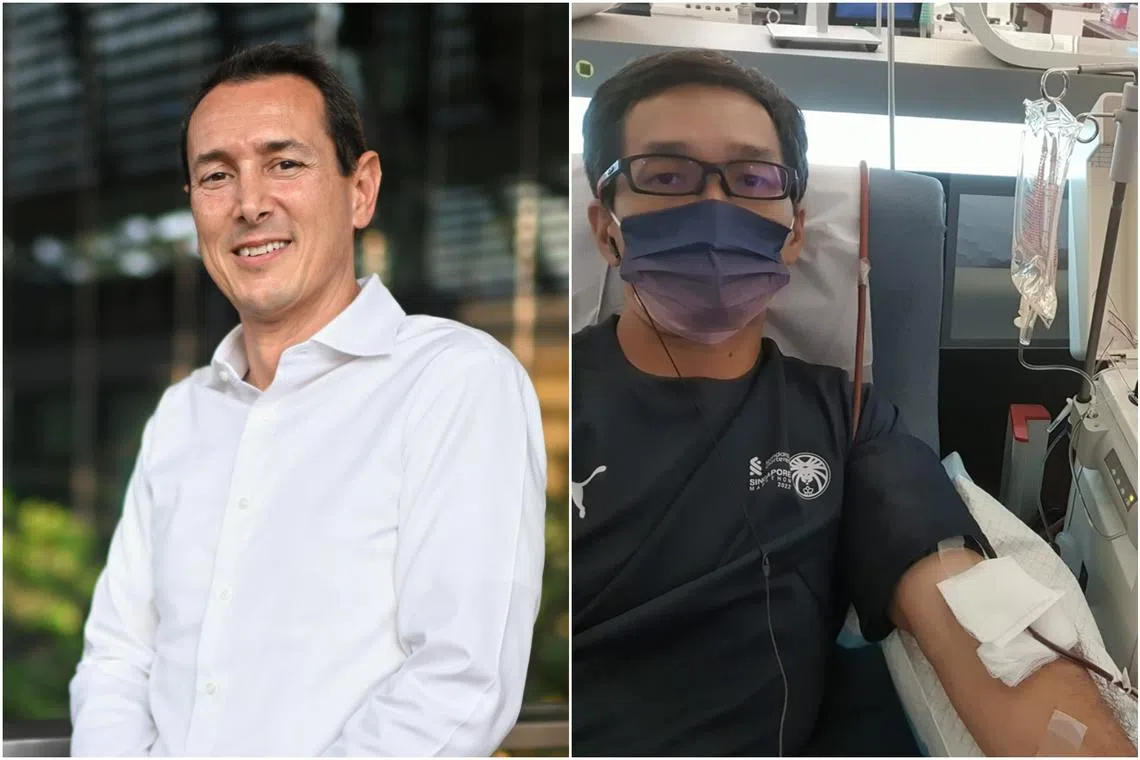More blood donors expected with easing of restriction on exposure to variant Creutzfeldt-Jakob disease
Sign up now: Get ST's newsletters delivered to your inbox

Italian expatriate Gabriele Possenti (left) and engineering manager Sim Yong Peng successfully donated their blood.
PHOTOS: SHINTARO TAY, COURTESY OF SIM YONG PENG
Follow topic:
SINGAPORE – Engineering manager Sim Yong Peng was a regular blood donor before he went to Britain to pursue his engineering degree from 1993 to 1995.
Due to possible exposure to the variant Creutzfeldt-Jakob disease (vCJD) while he was there, he could not donate blood for many years upon his return to Singapore.
With the easing of the vCJD restriction on Oct 2
As at Wednesday, nine donors who were previously affected by the vCJD restriction, including Mr Sim, had donated successfully.
The disease is caused by infectious proteins called prions that are transmitted through the consumption of meat and meat products from cows carrying the bovine spongiform encephalopathy (BSE, or mad cow disease) prion. In blood, the prion protein is found mainly in white blood cells.
As vCJD can incubate in a person for several decades and there are no reliable screening tests for it, HSA had previously adopted a risk mitigation strategy to defer donors with a history of residence or travel in areas where BSE might have been present, to prevent transfusion-transmitted vCJD in Singapore.
Following a review in 2022, HSA determined that the risk of transfusion-transmitted vCJD is low if the blood donations are leucodepleted, referring to a process that removes white blood cells from blood components.
The easing of the restriction applies only to apheresis donation for now, as it allows direct collection of leucodepleted blood products.
Donors with geographical risk exposure to vCJD, like Mr Sim, can now make donations by apheresis.
This is a specialised donation method where specific blood components, such as platelets, plasma or red blood cells, are collected, while returning the rest of the blood to the donor.
After his recent donation, Mr Sim was even able to lead a kayaking expedition from Sembawang to Punggol, and back, the next morning.
“My friends and I are happy and excited that we can donate our blood again. Before this, I had called the blood bank to check, but the answer was always that they would notify me when I could donate again,” said Mr Sim, who is looking forward to his next blood donation in December.
HSA told The Straits Times that it sent out letters in September to 320 donors who were affected by the vCJD restriction to inform them of the easing of the restriction.
It added that since the easing of the vCJD restriction on Oct 2, the response from blood donors has been encouraging.
Of the nine donors, five are Singaporeans who had stayed in Britain, France, Ireland or other European countries during the affected period. They had lived in Britain for three months or more from 1980 to 1996, or in France, Ireland or other European countries for five years or more since 1980.
Italian expatriate Gabriele Possenti, 52, moved to Singapore a year ago to work for a European bank here. He donated his platelets at Bloodbank@HSA on Oct 6.
“The process was quick and smooth and involved no pain,” he said. “I will definitely go back by mid-December.”
The HSA spokesperson said: “We expect more donors affected by the vCJD restriction to come forward to donate blood.”
Apheresis donation is available only at Bloodbank@HSA and takes approximately 90 minutes. Interested donors can find out more about vCJD and apheresis donation at www.hsa.gov.sg/vcjd

